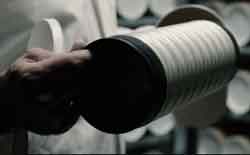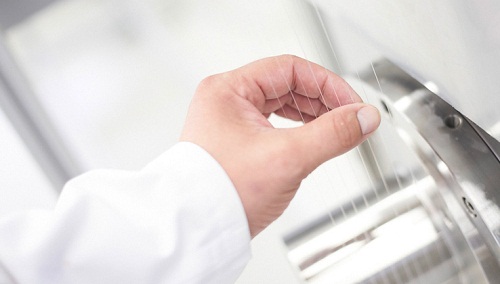"Biofabrication is changing the way clothes are made with four companies leading the revolution. At the helm of is AMSilk which uses genetically engineered bacteria to get around that problem. The company recently launched its first product made with spider silk — a luxury watch strap. It is working on several other products using the spider silk fibers, including biodegradable sneakers for Adidas."
 Biofabrication is changing the way clothes are made with four companies leading the revolution. At the helm of is AMSilk which uses genetically engineered bacteria to get around that problem. The company recently launched its first product made with spider silk — a luxury watch strap. It is working on several other products using the spider silk fibers, including biodegradable sneakers for Adidas.
Biofabrication is changing the way clothes are made with four companies leading the revolution. At the helm of is AMSilk which uses genetically engineered bacteria to get around that problem. The company recently launched its first product made with spider silk — a luxury watch strap. It is working on several other products using the spider silk fibers, including biodegradable sneakers for Adidas.
Making sustainable fashion with algae
The chemicals used to make and dye fabrics often harm and kill thousands of workers. These chemicals can also leach to the skin of the wearer. To prevent this German-Israeli firm Algalife grows fibers and dyes using algae. The clothes made at Algalife are more sustainable in terms of pollution, land, water and energy use. They also nurture the skin of the wearer with the natural compounds produced by seaweed. Algalife aims to reach mass production by 2020, with the first products focused on home and sportswear. The company, in future, plans to customise the specific compounds produced by algae, such as proteins or vitamins.
Fungi to create custom clothes
Another company, NEFFA has created a fabric out of mycelia — the roots of mushrooms. The fungi are grown in discs stuck together to create custom clothes without seams. The company has already created several prototypes of dresses, jackets and purses created using this method.
together to create custom clothes without seams. The company has already created several prototypes of dresses, jackets and purses created using this method.
Bacteria for dyeing clothes
To deal with the environmental impact the fashion industry makes in terms of water use and water pollution, UK firm Faber Futures is developing an alternative dyeing method through fermentation, using bacteria such as Streptomyces coelicolor. The company is developing colorfast dyes that don’t fade with time or washing. It also works with several brands to develop together the best strategies to incorporate this dyeing technology to their individual needs. The first of these products will be launched in the next couple of years.
A distant dream
However, there is still a long way to go before biofabrication replaces traditional fabric producing and dyeing methods. One of the big challenges is the process includes transforming prototype biological processes into industrial-scale production, which will be the key to make these products widely available and affordable.
Another challenge is determining the real impact that these new processes actually have on the environment. For this the company needs to look at sustainability in terms of the input. With the advancement of biofabrication, the fashion industry is poised to change radically. It will need to adjust to longer R&D cycles and slower consumption patterns. Although this will take time, biotechnology will definitely be the future of fashion.












